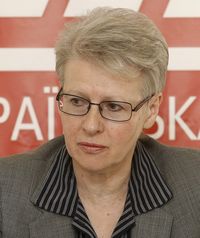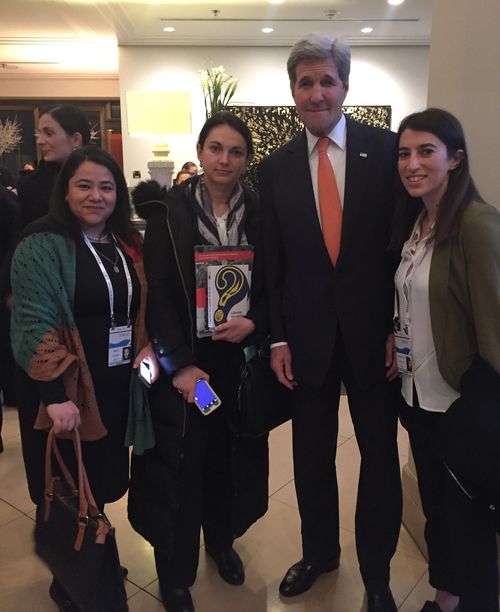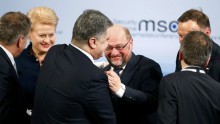The 52nd Munich Security Conference began on February 12 in an optimistic mood because of a possible ceasefire in Syria. However, it became clear by the time of completion of this forum, the world’s most prestigious, that such hopes were futile due to uncompromising stance of Russia, which is effectively implementing the Debaltseve scenario in the city of Aleppo. President Petro Poroshenko represented Ukraine in Munich, just as past year. In a speech which was broadcast live, he accused Vladimir Putin of aggression in the Donbas and called on the master of the Kremlin to withdraw Russian troops from Crimea as well. As aptly put by Chairman of the US Senate Committee on Armed Services Senator John McCain, “the only thing that has changed about Mr. Putin’s ambitions is that his appetite is growing with the eating.” Putin, meanwhile, spoke at the conference just once, back in 2007. This year, Russia’s stance was presented in Munich by Prime Minister Dmitry Medvedev and diplomacy chief Sergei Lavrov.
This bewildered, confused world!
How the Kremlin continues its efforts of “love enforcement” in Munich
By Lilia SHEVTSOVA, special to The Day
 That was exactly the impression left after the recent Munich Conference on Security, “Munich 2016” – the most prestigious international forum of the elite, dedicated to issues of foreign and security policy. Such forums, much like the Economic Forum in Davos, have never been and would not be a breakthrough in solving various global problems. But they always give an idea about the main challenges and the ability of the world’s political class to respond to them. So, “Munich 2016” has confirmed that the erosion of the world order continues, and the incompatibility of the interests between the world’s major players, combined with the lack of strategic vision, will, and courage makes it impossible to find a response to even the most dramatic crises of our time – the war in Syria, the inability of Europe to cope with the refugee influx, and the aggression against Ukraine.
That was exactly the impression left after the recent Munich Conference on Security, “Munich 2016” – the most prestigious international forum of the elite, dedicated to issues of foreign and security policy. Such forums, much like the Economic Forum in Davos, have never been and would not be a breakthrough in solving various global problems. But they always give an idea about the main challenges and the ability of the world’s political class to respond to them. So, “Munich 2016” has confirmed that the erosion of the world order continues, and the incompatibility of the interests between the world’s major players, combined with the lack of strategic vision, will, and courage makes it impossible to find a response to even the most dramatic crises of our time – the war in Syria, the inability of Europe to cope with the refugee influx, and the aggression against Ukraine.
Once again, we have seen the obvious: it is not possible to stop the process of the world order degradation and the proliferation of instability focal points, when the West has lost its path and finds itself in the “pause.” Liberal democracies have not yet been able to achieve unity on the issues to be dealt with in Munich. Those states which, it would seem, should have ensured this unity, are not ready (or not able?) to assume the leadership role. Angela Merkel is rapidly losing her political capital, trying to find a solution to the refugee crisis. And Obama wants to “outsource” every problem to anyone else, in preparation of his retirement. The bitter irony is that instead of the expected attempts by the Kremlin to save its face, the person to achieve this goal in Munich was the US Secretary of State Kerry, who has been looking for ways to disguise (albeit unsuccessfully) the bankruptcy of Obama’s foreign policy. And the success of these efforts at the event depended on whether a helping hand would have been offered by Sergei Lavrov. What an amusing story!
And what of Russia? Everything was just as expected. The Kremlin has decided to continue its efforts of “love enforcement” in Munich. Premier Medvedev tried to outdo Putin, who delivered his “Fulton speech” at the same Munich event in 2007 – that speech was the first bell, signaling the Russian turn towards revisionism (though the West had not believed Putin’s warning – in vain!). Today, Medvedev’s message was straightforward: stop being the deterrent to Russia (lift the sanctions and accept the Kremlin’s rules of the game), or you would not prevent a new Cold War and the “third global shake.” Medvedev’s speech was held in an incredibly tough tone; he picked menacing intonations and even rose on his tiptoes, trying to intimidate the audience – which responded with a nervous laugh. Lavrov went on with the tune, but gave the West what they had desperately craved for – a hope for a positive compromise. After all, the Western participants could not have left Munich achieving nothing in terms of agreement with the Kremlin – it would have been a nightmare! And Lavrov made it possible for Western colleagues to pretend that they did not come in vain and had actually achieved something: he allowed them to express an agreement on the Syrian truce. Lavrov even praised his opponents, saying that they are coming to “our understanding” and “it pleases us.” And who can understand him: whether it was just wishful thinking and bluffing on his part, or was he telling the truth?
However, the Russian delegation was unlikely to feel comfortable in Munich, hearing the accusations from all sides, especially for their Syrian campaign and the continuing bombardment of Aleppo. Not only the usual critics – Ukraine, Lithuania, and Poland – have indulged in mercilessly criticizing the Kremlin. The usually reserved Paris, Berlin, and London have allowed themselves to demonstrate dissatisfaction with Moscow. And even Kerry has uttered something reminiscent of criticism on Russia’s participation in the Aleppo bloodbath. But Moscow has long been accustomed to the discomfort. Especially as the meeting with the German businesses should have left the Russian delegation in good spirits: German business wanted to return to Russia. “Lift the sanctions” – Medvedev gave them the task, shining a confident smile towards the perceptive German business owners opposite of him. In general, I think the Russian official delegation have left Munich with a certain degree of satisfaction. The Russian participants were confirmed to what they wanted to believe: the West strives to end Russia’s isolation and it is malleable to blackmail. But most importantly, the reputation of some Western leaders (especially Obama) depends on Moscow’s willingness to cooperate with them.
And what is the bottom line? The Normandy Quartet meeting at the level of foreign ministers was futile. No progress on the issue of ensuring the Minsk agreements has been achieved. As one would have expected, Moscow was not ready to talk in explicit terms. No wonder the meeting was surprisingly short – just over 30 minutes! There was nothing to talk about. The arrangements of the international group on Syria to support the ceasefire in Syria are unlikely to succeed even according to their principal signatories – Lavrov and Kerry. How could it succeed, when the main parties involved in the conflict have no agreement on fundamental key issues – from the evaluation of al-Assad, to a definition of the moderate opposition? There is no unity even among the Western countries. Russia continues to bomb Aleppo as if nothing had happened. And al-Assad had said that he was going to conquer the entire Syria back! So, what ceasefire can one speak of?!
Here was a snapshot of the event, which turned out to be helpful in one regard: it has shown the nature of the current global problems, and the willingness of key world players to solve them.
Lilia Shevtsova is a senior fellow at the Brookings Institution
UKRAINE DESPERATELY NEEDS TO PRESERVE THE TRANSATLANTIC UNITY
Hanna HOPKO, head of the Verkhovna Rada Foreign Affairs Committee, Kyiv:
“Past year, Ukraine was a key topic at the Munich conference, but this year we were secondary. Yet another issue that has been a priority for Ukraine is internal reforms. Why those in power and their ‘dear friends’ continue to abuse their position? Are we not coming back to the mistakes that have been made after the Orange Revolution? Why the real power after the Revolution of Dignity emerged in the hands of those who wasted the chances of the Orange Revolution? It means that the conversations were private and fairly harsh. The president had to actually justify himself in regard of the situation around Aivaras Abromavicius. He spoke to an extent that everyone who was in power before him and was destroying a country had been oligarchs. And a question arose in many – who had been in power for those 25 years? What was the reason for this and why had nothing changed? This was said on the sidelines, and the emphasis in particular was on Martynenko’s resignation as a sacrifice on behalf of Yatseniuk – but it still does not justify him. And there were more questions on why the president would not remove Shokin. The questions were asked by experts who understand the situation in Ukraine very well. Many friends of Ukraine who are staying updated on recent developments and have their established channels of information, are concerned for the Ukrainian authorities not to have dallied too much and begin to justify the chances given to them in advance.

HANNA HOPKO MET WITH U.S. SECRETARY OF STATE JOHN KERRY AT THE MUNICH SECURITY CONFERENCE. AS SHE USUALLY DOES DURING MEETINGS WITH INFLUENTIAL WORLD LEADERS, SHE PRESENTED THE CHIEF OF AMERICAN DIPLOMACY WITH BOOK UKRAINE INCOGNITA. TOP 25 (AN ENGLISH-LANGUAGE VOLUME FROM DEN’S LIBRARY SERIES) TO PROMOTE A BETTER UNDERSTANDING OF DEVELOPMENTS IN UKRAINE / Photo from Hanna HOPKO’s Facebook page
“At the meeting dedicated to the Restoration of NATO, I stressed the importance of addressing security issues in Ukraine. If the hybrid diplomacy is continued in times of hybrid war, it will lead first to the hybrid peace, and then to the next conflict.
“Norwegian prime minister said that they understand the need to help Ukraine and they do help, providing economic and financial assistance. But Ukraine itself must finally show that it copes with the situation and makes the changes the people are concerned about happen. That is, the key message is this: although we have many things to reprimand the West for, but at the panel they do not want to hear about the corruption we have, but only about how we tackle this issue.
“As for the statements by the Russian prime minister and foreign minister at the conference, they are perceived very negatively. When past year Lavrov said that there were no Russian troops in Ukraine, the audience laughed. And this year’s calls for the dialog by Medvedev have not resonated in the gathering, as well as his allegations that there would be no Great Europe without Russia, and that the terrorism threat would grow, unless Russia and the West collaborate. He also urged to lift the sanctions, because it is not profitable both for Russia and European countries who suffer from it.
“Now, Western politicians are uncomfortable to talk on the subject of lifting the sanctions. It is clear that the sanctions are connected to the fulfillment of the Minsk agreements. Some of the Western partners say that the fulfillment should be bilateral, someone say that only Russia faces the requirement in this regard. But obviously there are alarming signs and trends in the attitude of some European countries towards Russia. Many EU countries have a desire to restore trade relations with Russia. Therefore, within the EU a great effort must be exerted in order to keep the status-quo and preserve the sanctions policy against Russia.
“It is clear that Medvedev’s speech was more targeted for the Russian audience, so that the propaganda channels might have showed that Ukraine was to blame. And he did not come to Munich seeking the dialog. And his last phrase proves it: he said that in the recent years after the Cold War we lived more or less normally, and now you are following the path of confrontation, which could lead to a third world shake-up.
“For Ukraine it is extremely important to maintain transatlantic unity, and to have the US and the EU keep up with the common plan on pressuring Putin. But even in private conversations with some advisers – Merkel and Kerry likewise – an abundantly clear message was articulated: without internal success, without concrete results in the fight against corruption, it would be very difficult to keep up the support regarding the situation in eastern Ukraine.
“The speech by the French Prime Minister Manuel Valls sounded very strange: on one hand he urged Russians not to bomb the civilian population in Syria, on the other he mentioned the downed Russian plane, failing to remember the Russian involvement in the attack on the MH17 flight over Donbas. For French the issues of international terrorism, refugees, and Syria are important. As for the Minsk agreements, we must struggle to ensure that the French position is rigid enough and not friendly towards Russia.”







